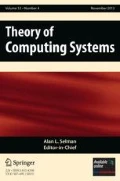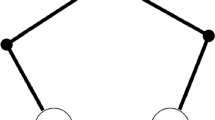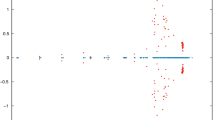Abstract
A set A is nontrivial for the linear-exponential-time class E=DTIME(2lin) if for any k≥1 there is a set B k ∈E such that B k is (p-m-)reducible to A and \(B_{k} \not\in \mathrm{DTIME}(2^{k\cdot n})\). I.e., intuitively, A is nontrivial for E if there are arbitrarily complex sets in E which can be reduced to A. Similarly, a set A is nontrivial for the polynomial-exponential-time class EXP=DTIME(2poly) if for any k≥1 there is a set \(\hat{B}_{k} \in \mathrm {EXP}\) such that \(\hat{B}_{k} \) is reducible to A and \(\hat{B}_{k} \not\in \mathrm{DTIME}(2^{n^{k}})\). We show that these notions are independent, namely, there are sets A 1 and A 2 in E such that A 1 is nontrivial for E but trivial for EXP and A 2 is nontrivial for EXP but trivial for E. In fact, the latter can be strengthened to show that there is a set A∈E which is weakly EXP-hard in the sense of Lutz (SIAM J. Comput. 24:1170–1189, 11) but E-trivial.
Similar content being viewed by others
References
Ambos-Spies, K.: Resource-bounded genericity. In: Computability, Enumerability, Unsolvability. London Math. Soc. Lecture Note Ser., vol. 224, pp. 1–59. Cambridge Univ. Press, Cambridge (1996)
Ambos-Spies, K., Bakibayev, T.: Weak completeness notions for exponential time. In: Proc. ICALP 2010, Part I. Lecture Notes in Comput. Sci., vol. 6198, pp. 503–514. Springer, Berlin (2010)
Ambos-Spies, K., Kräling, T.: Quantitative aspects of speed-up and gap phenomena. Mathematical Structures in Computer Science 20, 707–722 (2010)
Ambos-Spies, K., Mayordomo, E.: Resource-bounded measure and randomness. In: Complexity, Logic, and Recursion Theory. Lecture Notes in Pure and Appl. Math., vol. 187, pp. 1–47. Dekker, New York (1997)
Ambos-Spies, K., Terwijn, S.A., Zheng, X.: Resource bounded randomness and weakly complete problems. Theoret. Comput. Sci. 172, 195–207 (1997)
Balcázar, J.L., Díaz, J., Gabarró, J.: Structural Complexity I, 2nd edn. Springer, Berlin (1995)
Balcázar, J.L., Díaz, J., Gabarró, J.: Structural Complexity II. Springer, Berlin (1990)
Berman, L.: On the structure of complete sets: almost everywhere complexity and infinitely often speedup. In: 17th Annual Symposium on Foundations of Computer Science, pp. 76–80. IEEE Comput. Soc., Long Beach (1976)
Juedes, D.W., Lutz, J.H.: Weak completeness in E and E2. Theoret. Comput. Sci. 143, 149–158 (1995)
Lutz, J.H.: Almost everywhere high nonuniform complexity. J. Comput. System Sci. 44, 220–258 (1992)
Lutz, J.H.: Weakly hard problems. SIAM J. Comput. 24, 1170–1189 (1995)
Lutz, J.H.: The quantitative structure of exponential time. In: Complexity Theory Retrospective II, pp. 225–260. Springer, New York (1997)
Lutz, J.H., Mayordomo, E.: Measure, stochasticity, and the density of hard languages. SIAM J. Comput. 23, 762–779 (1994)
Author information
Authors and Affiliations
Corresponding author
Rights and permissions
About this article
Cite this article
Ambos-Spies, K., Bakibayev, T. Comparing Nontriviality for E and EXP. Theory Comput Syst 51, 106–122 (2012). https://doi.org/10.1007/s00224-011-9370-3
Published:
Issue Date:
DOI: https://doi.org/10.1007/s00224-011-9370-3




